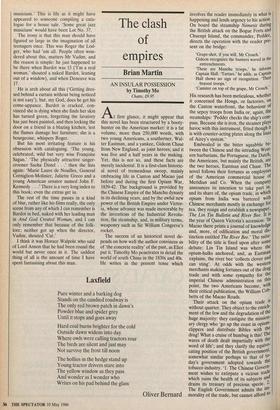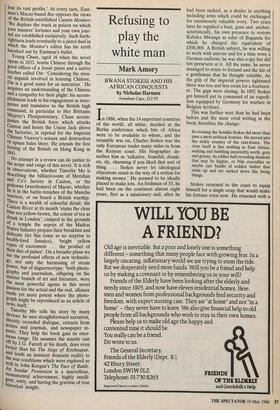The clash of empires
Brian Martin
AN INSULAR POSSESSION by Timothy Mo
Chatto, £9.95
Afirst glance, it might appear that this novel has been structured by a booty- hunter on the American market: it is a fat volume, more than 250,000 words, with two young Americans, a southerner, Wal- ter Eastman, and a yankee, Gideon Chase from New England, as joint heroes; and it was five and a half years in the making. Yet, this is not so, and these facts are merely incidental. It is a first-class historic- al novel of tremendous sweep, mainly embracing life in Canton and Macao just before and during the first Opium War, 1839-42. The backgtound is provided by the Chinese Empire of the Manchu dynasty in its declining years, and by the awful new power of the British Empire under Victor- ia, whose advance was made inexorable by the inventions of the Industrial Revolu- tion, the steamship, and, in military terms, weaponry such as Sir William Congreve's rocket.
The success of an historical novel de- pends on how well the author convinces us of 'the concrete reality' of the past, as Eliot put it. Timothy Mo penetrates in detail the world of south China in the 1830s and 40s. He writes in the present tense which involves the reader immediately in what is happening and lends urgency to his action. On board the steamship Nemesis during the British attack on the Bogue Forts and Chuenpi Island, the commander, Pedder, directs the operation with the reader pre- sent on the bridge:
`Grape-shot, if you will, Mr Crouch.' Gideon recognizes the banners waved in the entrenchments.
`These are Manchu troops,' he infotrs Captain Hall. `Tartars,' he adds, as Captain Hall shows no sign of recognition. `Their bravest troops.'
`Canister on top of the grape, Mr Crouch.'
His research has been meticulous, whether it concerned the Hongs, or factories, on the Canton waterfront, the behaviour of the sepoy troops from India or, again, the steamships: Tedder checks the ship's corn- pass. Because she is iron, the steamer plays havoc with this instrument, fitted though it is with counter-acting plates along the lines of Airey's system.' Embroiled in the bitter squabble be- tween the Chinese and the intruding West- ern barbarians, the Portuguese, the Dutch, the Americans, but mainly the British, are the two heroes, Eastman and Chase. The novel follows their fortunes as employees of the American commercial house of Meridian and Co. When the companY announces its intention to take part In, and its share of, the opium trade, in which opium from India was bartered with Chinese merchants mostly in exchange for tea, they resign and establish a newspaper, The Lin Tin Bulletin and River Bee. It is the year of Queen Victoria's accession: In Macao there prints a journal of knowledge and, more, of edification and moral dis- tinction entitled The River Bee.' The suita- bility of the title is fixed upon after some debate: Lin Tin Island was where the opium-hulks anchored, and, as Eastman explains, the river bee 'collects clover and can sting'. At odds with the western merchants making fortunes out of the drug trade and with some sympathy for dr imperial Chinese administration on this point, the two Americans become, with their critical publication, the William Cob" betts of the Macao Roads. Their attack on the opium trade is without quarter. They object to the enrich" ment of the few and the degradation of the huge majority: they castigate the mission- ary clergy who `go up the coast in opituo- clippers and distribute Bibles with the drug! What a cruise of humbug is this! The wares of death dealt impartially with the word of life'; and they clarify the equiv& cating position of the British government, somewhat similar perhaps to that of t0- day's government adopted towards the tobacco industry. '1. The Chinese Govern- ment wishes to extirpate a vicious trade which ruins the health of its subjects and drains its treasury of precious specie.. 2. The English Government admits the im- morality of the trade, but cannot afford to lose its vast profits.' At every turn, East- man's Macao-based Bee opposes the views of the British-established Canton Monitor: We deplore the truck in poison on which Your masters' fortunes and your own jour- nal are established exclusively. Such forth- rightness leads eventually to a pistol duel in Which the Monitor's editor has his teeth knocked out by Eastman's bullet. Young Chase, aged 16 when the novel Opens in 1833, learns Chinese through the good offices of a Jesuit priest and a native teacher called Ow: 'Considering the men- tal anguish involved in learning Chinese, Ow is a good name for an instructor.' He acquires an understanding of the Chinese and a sympathy for their plight: his accom- plishment leads to his engagement as inter- preter and translator to the British high Command, in particular to Her Brittanic Majesty's Plenipotentiary. Chase accom- panies the British force which attacks Canton and hoists the Union Jack above the factories, in reprisal for the Imperial Chinese Viceroy's seizure and destruction of opium bales there. He attends the first footing of the British on Hong Kong in 1841.
No attempt in a review can do justice to the scope and range of this novel. It is rich in observations, whether Timothy Mo is describing the billiard-room of Meridian and Co's factory in Canton, or the godowns (warehouses) of Macao, whether he is in the battle-trenches of the Manchu warriors, or on board a British warship. There is a wealth of colourful detail: the Canton River at its mouth `stains the clear blue sea yellow-brown, the colour of tea as drunk in London'; camped in the grounds of a temple the sepoys of the Madras Native Infantry prepare their breakfast and defecate (let this come as no surprise to health-food fanatics), 'bright yellow ropes of excrement . . . the product of their diet of pulses'. On a broader plane we see the profound effects of new technolo- gy, not only the harnessing of steam Power, but of daguerreotype: 'both photo- graphy and journalism, offspring on the sinister branch of art and literature, were the most powerful agents in this novel passion for the actual and the real, alliance made yet more potent where the photo- graph might be reproduced as an article of news itself.'
Timothy Mo tells his story by many devices: he uses straightforward narration, directly recorded dialogue, extracts from letters and journals, and newspaper re- P°rts. They help the book gain its enor- mous range. He assumes the mantle cast off by J.G. Farrell at his death, does even better than his The Siege of Krishnapur, and lends an insistent dramatic reality to the war conditions which were explored so Well in John Keegan's The Face of Battle. An Insular Possession is a marvellous, monumental achievement, highly intelli- nt, witty, and having the gravitas of true historical insight.



























































 Previous page
Previous page